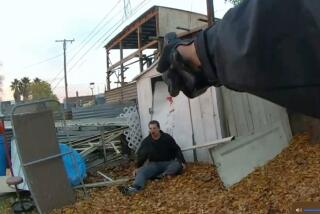Family Faults Officials in Shooting Case : Crime: Relatives of a 17-year-old slain by the son of a Vista judge say the gunman is being given preferential treatment. Police say that’s not true.
- Share via
The family of an Oceanside teen-ager who was fatally shot claims police are giving the gunman special treatment because his father is a North County Superior Court judge.
Police deny any preferential treatment and say that a preliminary investigation indicates that the shooting was in self-defense.
Christopher F. Mitchell killed 17-year-old Raed Hamdi last week, reportedly because he suspected him of being a prowler and because Hamdi was threatening Mitchell with a large knife.
Mitchell, the 23-year-old son of Superior Court Judge Franklin Mitchell, was arrested immediately afterward and interviewed by detectives, said Bob George, a spokesman for the Oceanside Police Department.
He was later released because investigators “didn’t have enough evidence to hold him at that particular time,” George said. “There were allegations of self-defense at that time. . . . We’re not treating it any differently from any other case.”
Hamdi was shot about 10:30 p.m. Aug. 20 in the 2100 block of Via Robles by Mitchell after a neighbor in their four-unit apartment building called to tell him and his brother that someone was lurking nearby, George said.
Mitchell armed himself with a 9-millimeter semiautomatic handgun, and his brother took a .357-caliber handgun, and the two went downstairs to confront what they thought was a prowler, George said.
They found Hamdi outside, and, according to several witnesses, the brothers “were going to try to hold him for the police and (Hamdi) began threatening them with a knife,” George said.
Then, Mitchell reportedly shot the youth three times in the upper body and once in the leg. He died at 11:28 p.m. at Scripps Memorial Hospital in La Jolla.
Police said they recovered four empty cartridges and a hunting-size knife at the scene, but Hamdi’s family insisted that the youth never owned a large knife, and that he was only using a shortcut to a friend’s house when he was killed.
“We want to clear his name and clear his family’s name. There’s no reason for someone to say the kid was a prowler when he has no criminal record whatsoever,” said Najeh Hamdi, the victim’s uncle.
The police investigation of the shooting has been extremely sloppy, Najeh Hamdi said. He claimed that investigators first said a pocketknife was recovered, then changed it to a hunting knife.
Detectives have also neglected to question the family about the shooting, except to tell them that Hamdi was a suspected prowler, the uncle said. “I know that being a judge’s son has something to do with it,” he said.
Attempts to reach Mitchell and his father Friday were unsuccessful.
Sources close to the investigation said Hamdi family members were contacted and interviewed the morning after the shooting. Because the victim was a juvenile, any record he might have had would not be released, George said.
Police normally release the names of all people involved in a crime unless it is a sexual crime such as rape, they are juveniles or they need their identity concealed because of witness intimidation.
But police waited two days to release Mitchell’s name as the gunman because of “extenuating circumstances which we really don’t want to discuss at this time,” George said.
The case is scheduled to be filed in the district attorney’s office in Vista for review early next week, but it will be handled by prosecutors in downtown San Diego because “it dispels any claim that there might be any bias,” said Robert Sullivan, who heads the felony division of the Vista office. A Vista prosecutor reviewing the case to decide whether to file charges against Mitchell would be likely to appear in Judge Mitchell’s courtroom in a different case later, Sullivan said.
A prosecutor reviewing such cases relies on information provided by police, but may ask for a separate investigation if he or she feels the police investigation was lacking, Sullivan said.
He added, however, that “it probably isn’t necessary to conduct a separate investigation” and that such instances are “very, very, very rare.”
More to Read
Sign up for Essential California
The most important California stories and recommendations in your inbox every morning.
You may occasionally receive promotional content from the Los Angeles Times.












